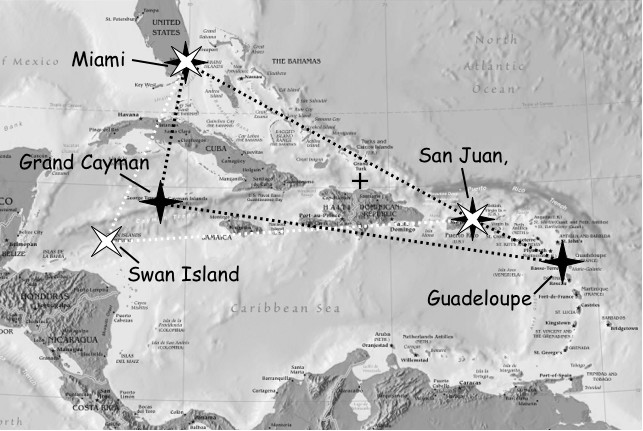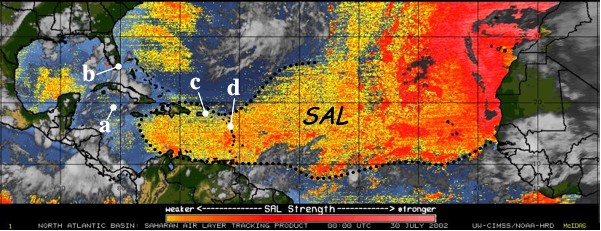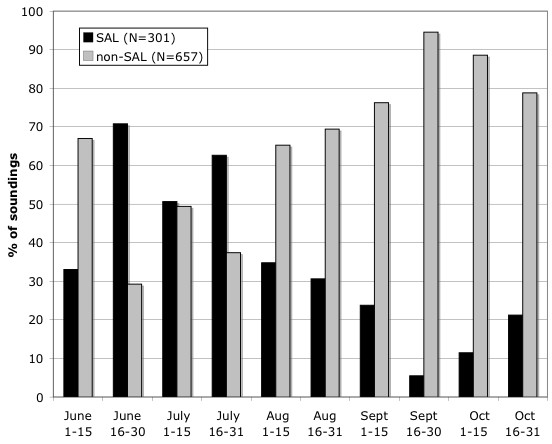Back to Hurricane Intensity Change projects
|
Back to Main Projects Page
Development of a New Set of Mean Atmospheric Soundings for the
Tropical North Atlantic and Caribbean Sea
Principle Investigator : Jason Dunion (HRD)
Team Members:
Sim Aberson (HRD)
Mike Black (HRD)
Neal Dorst (HRD)
Jeff Hawkins (NRL)
John Kaplan (HRD)
Chris Landsea (HRD)
Paul Leighton (HRD)
Frank Marks (HRD)
Mark Powell (HRD)
Rob Rogers (HRD)
Joseph Prospero (UM/CIMAS)
Chris Velden (UW/CIMSS)

Sounding stations used in Jordan (1958) in white, and in Dunion and Marron
(2008) in black.
Objectives:
- Test the following hypotheses related to Jordan's (1958) Mean Soundings
for the West Indies Area:
- Jordan's work may need to be revisited based on recent advances in our
understanding of the Saharan Air Layer (SAL).
- Since the SAL can cover and area the size of the continental U.S. and can
reach as far west as the western Caribbean Sea, Central America and the Gulf
of Mexico, we hypothesize that his 10-yr climatology may have contained a
mixture of dry Saharan and moist tropical atmospheric soundings. This
suggests that the North Atlantic contains a bi-modal distribution of soundings
and that a single mean sounding (i.e. Jordan's) may not effectively represent
the atmospheric conditions that occur in this basin during the hurricane
season.
- We hypothesize that new GOES SAL tracking satellite imagery presented by
Dunion and Velden (2004) can be used to identify dry, dusty SAL vs moist
tropical (non-SAL) atmospheric soundings. These two types of distinct
soundings will be partitioned to create a new set of mean 'hurricane season'
atmospheric soundings (SAL and non-SAL) for the tropical North Atlantic and
Caribbean Sea region.
- Develop a new set of atmospheric soundings for the tropical North Atlantic
and Caribbean Sea region that will better represent the mean conditions that
affect this part of the globe.
- Use modeling studies to assess the impact of these new atmospheric
soundings (SAL vs non-SAL) on tropical cyclone genesis and intensity change.
Methods:
- Generate an archive of basin-wide GOES SAL tracking imagery that will span
from 1995-present (00 & 12 UTC);
- Generate a quality controlled archive of rawinsonde data that spans from
1995-2002 (00 & 12 UTC) for the following stations: Grand Cayman, Miami, FL,
San Juan, PR, and Guadeloupe;

Satellite depiction of Saharan Air Layer with sounding stations used in in
Dunion and Marron (2008) designated by letters.
Accomplishments:
- Published article in the Journal of Climate that presents
evidence that Jordan's (1958) Mean Soundings for the West Indies Area likely
contained a large percentage of SAL soundings and presents a preliminary new
set of atmospheric soundings (SAL and non-SAL) for the tropical North Atlantic
and Caribbean Sea. This study uses GOES SAL tracking satellite imagery to
identify hundreds of rawinsondes from the 2002 hurricane season that were
launched in SAL versus non-SAL environments;

Histogram of SAL and non-SAL soundings by month [Dunion and Marron (2008)].
References:
Dunion, J.P., and C.S. Marron, 2008: A Reexamination of the Jordan mean
tropical sounding based on awareness of the Saharan Air Layer: Results from
2002. J. Climate. 21 no. 20, 5242-5253.
Jordan, C.L., 1958: Mean soundings for the West Indies area. J. Meteor.
, 15, 91-97.
Future Work:
- Develop a new set of atmospheric soundings for the tropical North Atlantic
and Caribbean Sea using GOES SAL tracking satellite imagery and 8 years
(1995-2002) of Caribbean rawinsonde data;
Back to Hurricane Intensity Change projects
|
Back to Main Projects Page
Last modified: 2/27/2009
|



